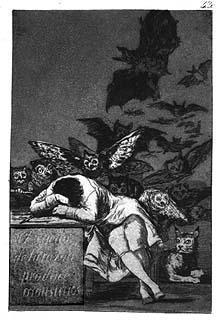 Between 1900 and 1903, Norwegian playwright Henrik Ibsen suffered a series of three strokes that robbed him of his memory for words and left him with no further ability to write. Peter Watts, in an essay on Ibsen's life, describes how in those last days (Ibsen died in 1906) Ibsen's son, Sigurd, came upon his father sitting at his table, struggling to write out the letters of the alphabet. I can't think of a more heartbreaking sight.
Between 1900 and 1903, Norwegian playwright Henrik Ibsen suffered a series of three strokes that robbed him of his memory for words and left him with no further ability to write. Peter Watts, in an essay on Ibsen's life, describes how in those last days (Ibsen died in 1906) Ibsen's son, Sigurd, came upon his father sitting at his table, struggling to write out the letters of the alphabet. I can't think of a more heartbreaking sight.Was this perhaps vengeance from the God that Ibsen had spent a lifetime denying? What sort of petty tyrant inflicts a punishment so treacherous on so worthy an adversary? How insecure do you have to be to enforce so cruel a censorship?
All his life, Ibsen showed us the haunting visage of human misery, stripped of all adornment. His plays are a celebration of Irony (that greatest and most potent of all demons), of the importance of the individual, of the need to live greedily and without guilt and to enjoy and suffer the terrible beauty of our lives with all the raw force that we can muster. It is both glorious and ironic that his own last years should be so exact a vindication of all his writing.
Someone asked me once if I was afraid to die, and I replied of course, who isn't? But there are things I am more afraid of than death - and the loss of words is one of them.
P.S. The painting: Francisco Goya El sueño de la razón produce monstruos which Babelfish translates as 'The dream of reason produces monsters'
P.P.S. Sorry about the F minor note - that's what happens when you stay up till 3 am reading Ibsen. Tomorrow will be a happier day. I promise.




3 comments:
aphasia is my Boggart too( well, and birds)- didn't i send you poem about that once? Your post reminded me of incident where bunch of us were visting Ezekiel, and his memories were so messed up with Alzhiemers he couldn't recognise his own poems.
There are so many examples of artists suffering from mental and emotional illnesses( and yes, even though some of it is wonderful, creativity-wise), it makes you think there is merit in the whole God-revelling-in schadenfreude argument( gorgeous word no?)
"Most wretched men are cradled to poetry by wrong / They learn in suffering what they teach in song" - P.B. Shelley.
Exactly. Though I think what makes Aphasia (or Alzhiemers - and yes, Ezekiel is such a sad case)so terrible is that it robs you of the ability to write even as it gives you things to write about. On the whole I'm not sure that it's not worth suffering if you can get great art out of it (Lowell writes: "Who would rather be his indexed correspondents / Than the boy Keats spitting out blood for time to breathe") but it's clearly not worth it if it ends up silencing you. It's not the suffering in itself, it's the frustration of being cut off from the one thing that's really important to you.
And ah, Schadenfreude! beautiful, beautiful. Though I must admit I'm fairly partial to German words - I love how they're all multi-syllable and sort of dense and weighty. Think doppelganger, think meistersinger. Just compare Zauberflote to Magic Flute. What a wonderfully stately language!
Yeah, right.
Only the Germans could have come up with a word like schmetterling to make a beautiful creature sound like a mechanical contraption...
Post a Comment